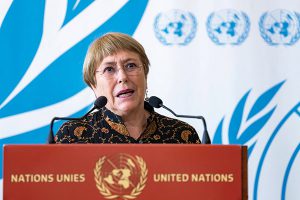Bloomberg
UN rights chief Michelle Bachelet said she was unable to visit detained Uyghurs and that she was accompanied by authorities while visiting Xinjiang, remarks that raise questions about the Chinese government’s efforts to influence her trip.
“I was not able to speak to any Uyghurs currently detained or their families during the visit,†Bachelet told a meeting of the Human Rights Council on Wednesday, adding that the visit to China faced “limitations, especially given the prevailing Covid restrictions.â€
Bachelet did say the government helped her meet “all institutions I had asked to meet, such as senior members of key ministries, the judiciary, business, academia, and other relevant stakeholders,†and repeated that her trip wasn’t an “investigation.â€
Human rights activists have criticized Bachelet’s visit to the Asian nation — the first by a UN human rights chief since 2005. Sophie Richardson, the China director at Human Rights Watch, said earlier it gave the Chinese government the lack of criticism on human rights that it desired.
US Secretary of State Antony Blinken’s press office also said Washington was concerned about Beijing’s efforts to manipulate Bachelet’s travels because conditions imposed by the government wouldn’t allow for an “independent assessment of the human rights environment.â€
Rights issues have turned into a flashpoint in China-US ties. The topic is likely to become even more charged on June 21, when the US will start blocking imports from China’s far western Xinjiang region under the Uyghur Forced Labor Prevention Act unless companies can prove the goods weren’t made with forced labor.
China has called on the US to abandon the law and regularly denies it commits abuses in Xinjiang and elsewhere. The US, lawmakers in some nations and rights groups say China’s activities in Xinjiang amount to genocide against minority groups.
Chinese President Xi Jinping signaled his nation is unlikely to back down on the issue, writing in a Communist Party magazine this month that certain nations “have been forcibly promoting Western democratic human rights concepts and systems in the world and using human rights issues to interfere in the internal affairs of other countries, resulting in frequent wars, long-term social unrest and displacement of people in some countries.â€
On Tuesday, the Netherlands issued a statement on behalf of the 47 members of the Human Rights Council that told Bachelet the members are “gravely concerned about the human rights situation in Xinjiang.†The same day Cuba delivered a statement signed by 69 countries that said they supported Beijing’s position on Xinjiang, Tibet and Hong Kong issues, and opposed the use of human rights to interfere in countries’ internal affairs.
 The Gulf Time Newspaper One of the finest business newspapers in the UAE brought to you by our professional writers and editors.
The Gulf Time Newspaper One of the finest business newspapers in the UAE brought to you by our professional writers and editors.
